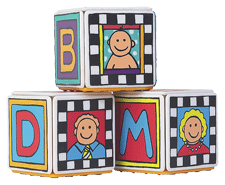Social-Emotional Development
Goals of the Dimension:
- Children are able to interact positively with one another and with adults.
- Children are able to solve problems without resorting to violence or withdrawal behavior.
- Children demonstrate tolerance for other children who are different from themselves.
The building blocks for successful relationships and a healthy sense of self begins when a child is an infant.
Very early personal relationships and experiences set the stage for how a child:
- Learns to manage his or her emotions (self-regulation),
- Feels about themselves (self-confidence),
- Relates to others and the world around them (competence).
When children learn a healthy method of managing their emotions, feel positively about themselves, and are included in healthy relationships with those closest to them, they are more likely to:
- Succeed in group situations (schools, community settings, etc.),
- Concentrate and learn successfully,
- Effectively communicate their feelings,
- Continually develop self-confidence and self-esteem
A child uses his or her emotional skills to interact with others. This includes playing and developing relationships with peers, interaction with caregivers and parents, adapting to a variety of environments, and learning about the larger world.
Emotional competence is a vital aspect of a child's social and ultimately, overall development.
Additional Resources:
Youth Guidance Mentoring & Activities Program
Complete a Whole Child Profile to access appropriate resources for your family!


